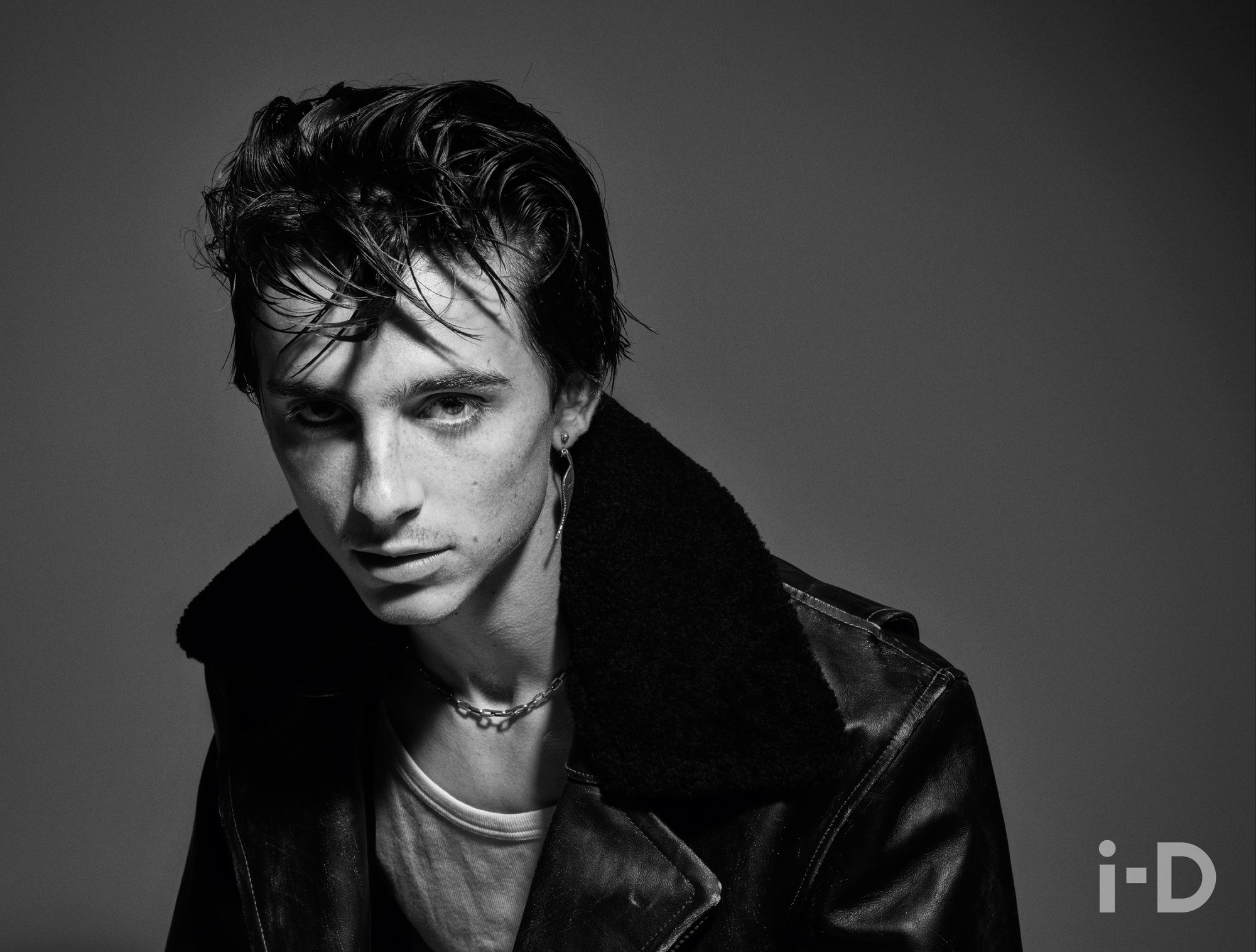This story originally appeared in i-D’s The Superstar Issue, no. 354, 2018.
Timothée Chalamet is the Oscar nominated teen heartthrob redefining what it means to be a leading man in 2018. Harry Styles is the platinum-selling award-winning musician asking the world to treat people with kindness. To mark the release of Timothée’s hotly anticipated new film Beautiful Boy, they discuss navigating fame, social media and modern masculinity,
When Timothée Chalamet shot onto our screens in Call Me by Your Name in 2017, the world fell hard and fast in love with his delicate face and foppish hair. Despite his beauty, it was Timothée’s skill and power in the role of trilingual, precocious, Elio, that was most revelatory. It was a role that deservedly earned him the youngest Best Actor Oscar nomination in 80 years, and his star has been on an upward trajectory since.
Timothée went on to appear in the Oscar-nominated, Greta Gerwig-directed Ladybird, in which he gave the high school cool kid surprising emotional depth, but it is his current role in the Felix van Groeningen-directed Beautiful Boy that has taken his star to the next level.
In Beautiful Boy, Timothée plays well-to-do teen, Nic, who spirals into crystal meth addiction to the horror of his journalist father, David, played by Steve Carell. From the outside, Nic has an enviable life. Living in San Francisco’s Bay area on the beautiful, surfwashed north California coast, a bright future awaits him. That’s until his interest in drugs takes a dark turn and he abandons home, descending into addiction. Based on the memoirs of father-and-son David and Nic Sheff, the dual perspective is what gives Beautiful Boy its devastating impact.
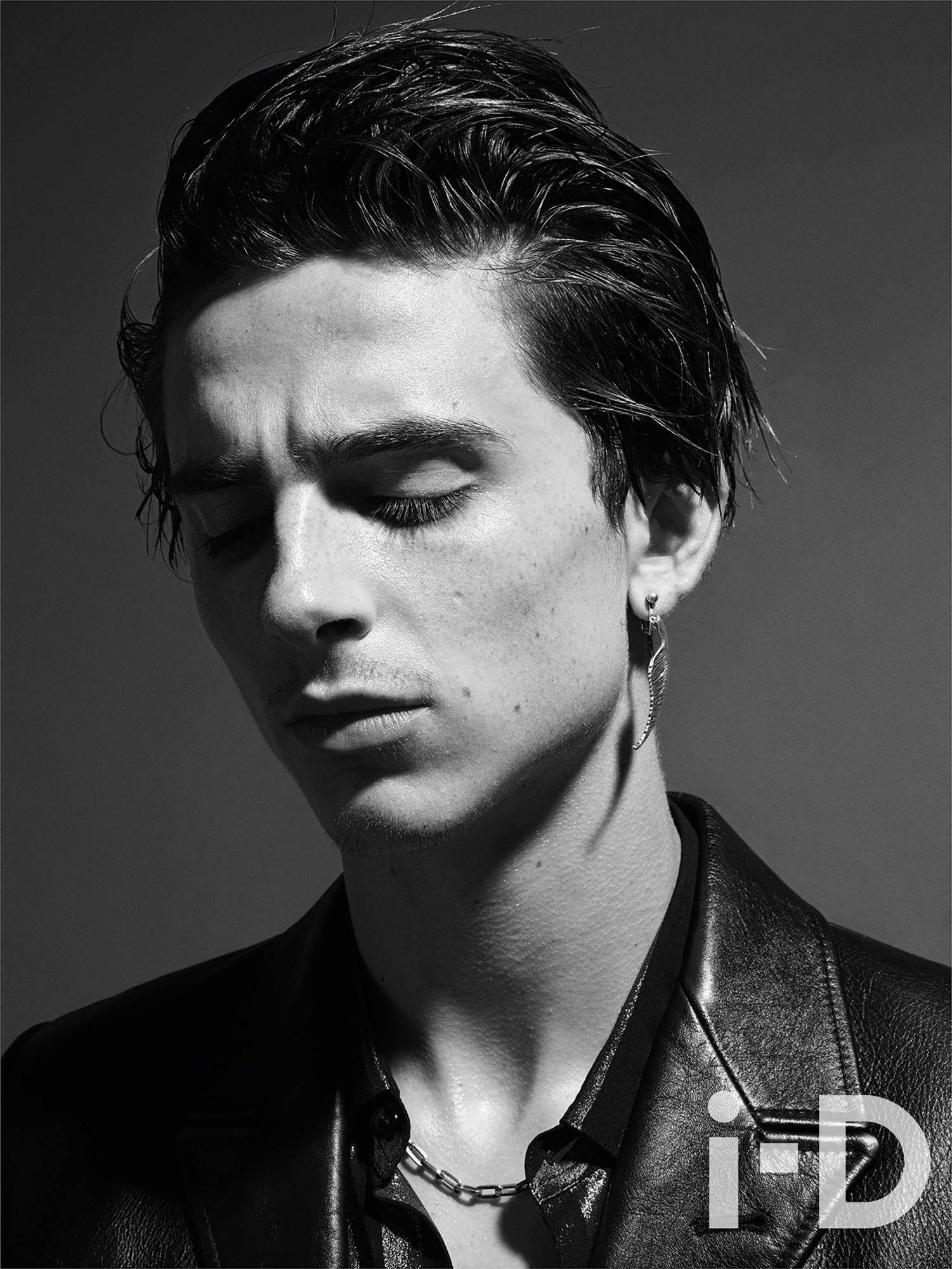
Timothée gives a visceral performance as a desperate, wounded Nic, while his father struggles to account for what went wrong. The cycle of recovery and relapse and back again makes for blistering viewing, but unlike other drug films, Beautiful Boy offers no trite, moralistic answers. It exists instead as a powerful account of a father and son’s relationship and the addiction that shatters their world.
Timothée captures Nic in all his complexities; from meeting his dad in a San Fran café obnoxiously strung out, only to ruthlessly scam him for cash, to being clean and back home again wearing the broken demeanour of someone who knows recovery won’t last. Tear-inducing and hard to watch, the film is deservedly gaining major Oscar buzz. In a post #MeToo world, Timothée Chalamet represents the change we want to see in the film industry. He’s sensitive, honest, thoughtful, polite, goofy, and self-aware. He’s in touch with his feminine side, and he smiles. A lot.
Loved by girls and boys alike for his pretty looks, he’s the modern teen heartthrob, the likes of which we haven’t seen in film for years. Existing in the same lineage as James Dean, River Phoenix and Leonardo DiCaprio, the 22-year-old New Yorker’s rushed at premieres, stalked online, hounded by gossip columnists and trailed by paparazzi. The internet is obsessed with him. There are hashtags dedicated to documenting his every move; from #timotheechalametdoingthings to #timotheechalamethair. Earlier this year, the Instagram account @chalametinart went viral by photoshopping Timothée into famous works of art including Michelangelo’s David and Botticelli’s The Birth of Venus, with the tagline “Proof he really is a masterpiece”.
Serious about acting, but playful about his own role in it, off screen Timothée’s as much a fanboy as the rest of us. He fawns over Cardi B, Kid Cudi and Frank Ocean, just as much as we flip out about his LaGuardia high school rap videos, which have been watched on YouTube over a million times. At the premiere for Beautiful Boy in London this October, Timothée wore a floral handpainted suit by Sarah Burton at McQueen. It was a look more than a little reminiscent of a certain Harry Styles, and it sent the internet into meltdown.
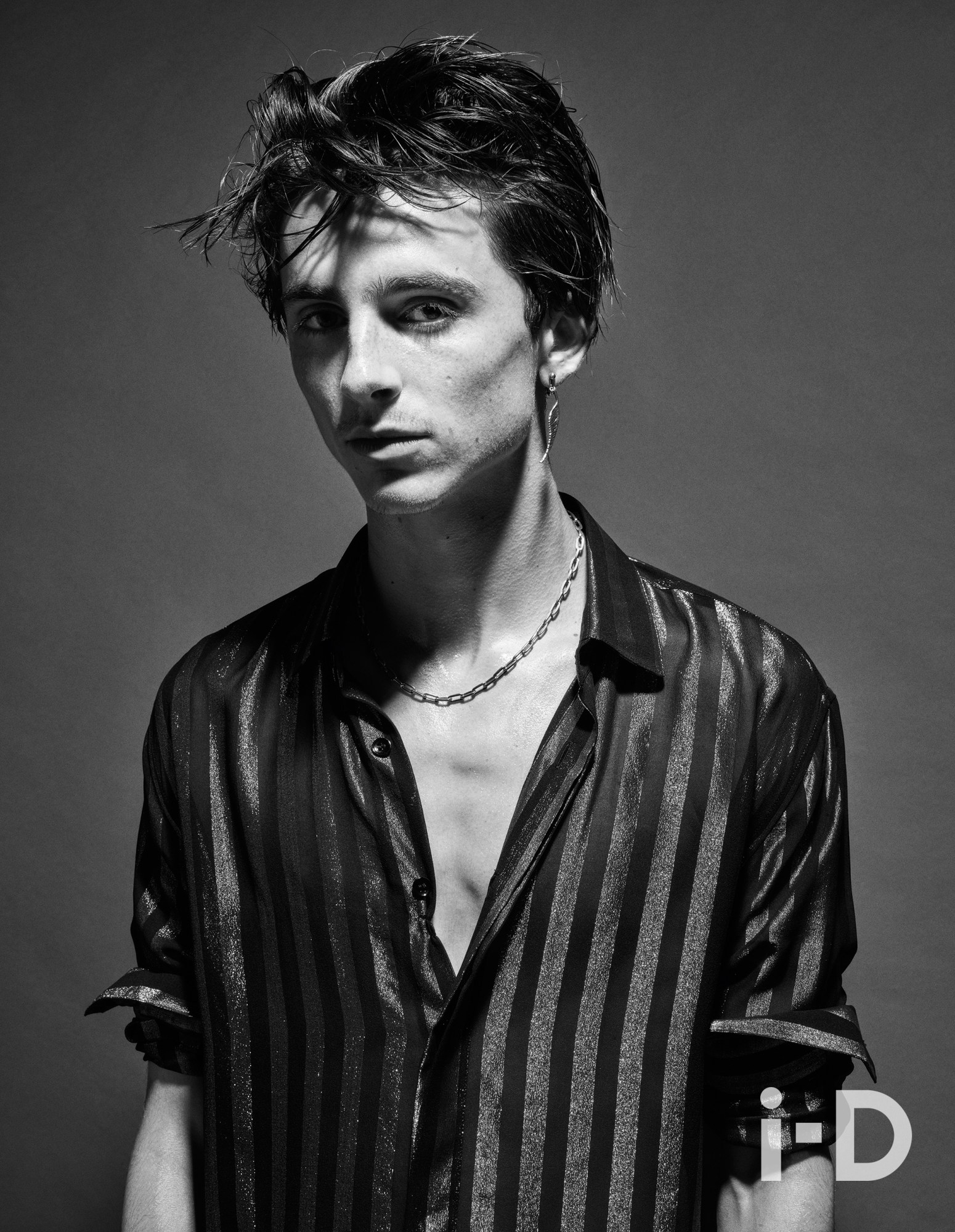
It isn’t the first time comparisons have been made between the actor and the pop star. Timothée and Harry is a future friendship the internet has willed into existence. There are Tumblr accounts, video montages, memes and fanfiction dedicated to them. When they started following each other on Instagram earlier this year, a million teenagers across the globe collectively exhaled. Together they represent a new masculinity, one that’s sensitive, thoughtful, creative and unafraid to be who they are. Amazingly they’ve never properly met.
It’s this comfort in vulnerability that has launched Timothée into one of the most vital and sought after actors of his generation. Next year, we will see him flexing his muscles as Henry V in Netflix’s The King, before working with Greta Gerwig again in her star-studded adaptation of Little Women, and Denis Villeneuve on his reboot of the visionary science-fiction novel, Dune. There’s even talk of a sequel to Call Me by Your Name. But first, he’s got a very important phone call to take…
Harry Styles: Mr Chalamet…
Timothée Chalamet: Mr Styles… it’s nice to meet you over the phone. Thank you for doing this. H: Thanks for asking. I saw Beautiful Boy this morning and it’s great.
T: Thank you for taking the time to watch it. It really means a lot. H: My first question; David Bowie once said that, “Creativity is like wading out into the ocean. You wade out to the point where you can’t touch the bottom, you’re a little scared, and that’s where you do your best work.” Do you agree?
T: I do agree. It reminds me of a quote – if someone tells an artist that they’re brave, they’re really telling them that they’re crazy. I think that whatever bone gets electrified when I act, there’s always a feeling that I’m a little bit out of my depth or out of control. H: I think if you stay in that safe space all the time, it’s very easy to get bored. It’s important to rip it up and start again sometimes…
T: … and be bad and take risks. I know from working on a movie that if a scene goes wrong, and there’s laughter on set, it loosens you up for the next take, it’s better than protecting yourself and getting lost in your head. The greatest teacher for me has been experience. H: Your character in Beautiful Boy is a pretty intense part. Are you someone who stays in character when the camera cuts, or are you able to flip it on and off?
T: My part in Beautiful Boy stayed with me longer than I thought it would. I thought one of the traps of this role, especially as a nervous young actor, was going to be to lean into the seriousness of it. I didn’t want to try and be as hard on myself as possible, thinking that was what it would take to make it good. After the last day of shooting, I had the strangest walk home. I didn’t even live it, Nic and David did, but I still felt really affected, drained and a little devastated. The movie isn’t a downer, because it is really redemptive and hopeful, but it did feel like a punch to the stomach.
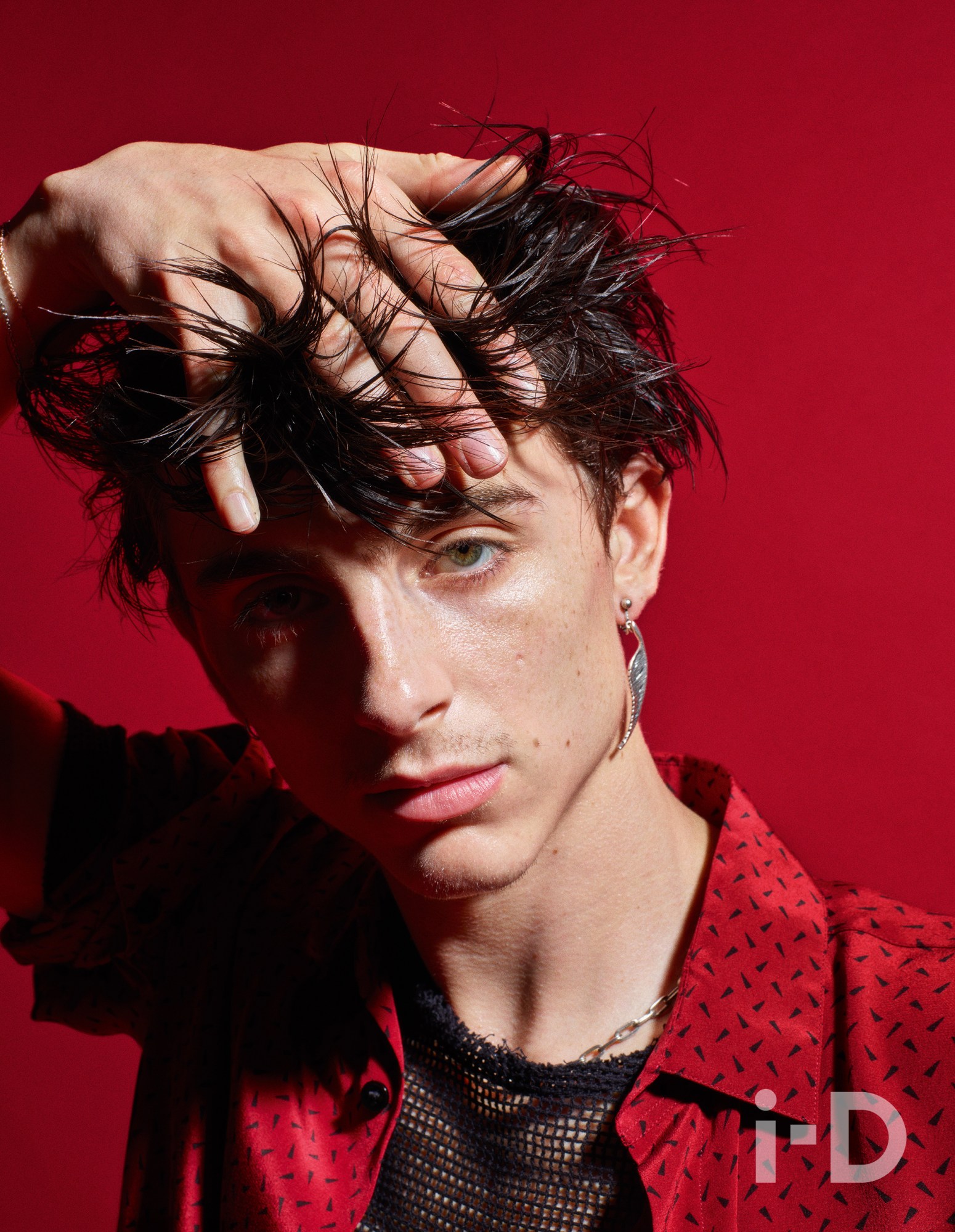
H: We all know addiction is an illness that affects so many people, so why do you think it is still cloaked in so much secrecy and shame?
T: I’m no authority on this, but I think it’s because it’s easier to see it that way. It’s comforting for people to give a face to addiction and think it couldn’t affect you, your family or your loved ones. When the reality, like you said, is that it’s an illness that doesn’t discriminate. It knows no race, class or gender. It’s a very human illness that affects a lot of people our age. One of the things I really like about Beautiful Boy is it doesn’t really get into why Nic’s addicted. I think it’s easier for people to think it’s a choice, that when people are addicted they’re on this big party binge and euphoria, when there’s often a big black hole, as Nic would say, or a place of pain.
H: When you first watched the completed film, did anything about how it turned out surprise you?
T: I was more terrified to see this movie than anything I’ve ever been in before because it was based on real people. I really felt pressure, and seeing it for the first time wasn’t the most comfortable experience. H: Whenever I’ve done stuff in film or music videos, I often put secret messages in for friends; like I’ll have someone’s name in something or I’ll wear necklaces that my friend’s kids have made or something. Do you ever put secret messages to people in your movies?
T: I’m a very tactile actor, and if I start getting it in my head that I suck, then I do start reaching out for things and I do have little mementos. Certainly on a film like Call Me By Your Name, when we were shooting in a house, there were lots of nooks and crannies where I felt safer. I have little things for myself in each role and little things I try to take with me after I wrap. H: When you were reading the script for Call Me By Your Name what was the one scene that made you think you have to do this?
T: It might be the scene where Elio reveals his feelings for Oliver by the war monument. The book is so genuine, so accomplished and well written that I felt like that one scene would be a barometer for whether we would pull it off or not. On the day, Luca Guadagnino didn’t quite know how he wanted to shoot it, and it was actually Armie Hammer who had the idea to do it in one take and in a wide shot. It took away the whole cringey Hollywood feeling. If you mute the movie you can’t tell it’s somebody telling somebody else that they are in love with them.
H: Which is a much more real way in which that would happen…
T: I think so… you might scare someone away if you went too big. H: There have been rumblings of a sequel, are you nervous about carrying on a story that so many people loved?
T: We made the first movie in the humble hope that fans of the books would go and see it. I would love to do a sequel, that challenge is really exciting to me. H: Can you still eat peaches?
T: [Laughs] Umm I can, but not without thinking about it… H: I’ve had a hard time…
T: [Laughs again] That’s the most awkward scene to see with your parents in the whole world. My poor father… H: I’m sure he’s done it too. You’re close with your family, right?
T: Yes, I am. Are you the same?
H: Yeah, sometimes my parents will come on tour and it’s always nice to have them around. The last couple of years have been nuts for you. What role have your parents played in keeping some sense of normalcy around you?
T: I think the most precious thing I get from my parents – and I try and give it back to them as much as I can – is their love and support. I hope that doesn’t sound cheesy, but it’s true. In your late teens, early twenties you suddenly realise that your parents are human. That doesn’t mean I don’t get really great advice from them, because I do. But you reach a certain age and you take control of your own life. My mum recently put this photo up of her and my dad at the LA premiere of Beautiful Boy and its heart shattering in a great way, they’re just beaming with pride. It’s almost overwhelming.
H: Do you ever get a moment to yourself to take it all in, and realise just how amazing this is? I keep a journal, as I always find it helps with writing songs. Even if it’s just bullet points to make me stop and keep track of what’s happening.
T: Yeah, I keep a journal and I’ll jot down thoughts in the notes app on my phone too. Gratitude and appreciating where you are is very important to me, but that comes with time. Having enough time to write in a journal or simply be thankful. I have about a year and half of work coming up now, I’m doing Little Women and Dune… and I hope I can take time to appreciate it all. What comforts me is that when I wake up, within healthy boundaries, I always have a subtle feeling of gratitude. It’s really awesome to hear that someone like you, who’s been doing this for a good amount of time, has that objectivity and ability to take a step back and write in that journal. To take time to self reflect is important.
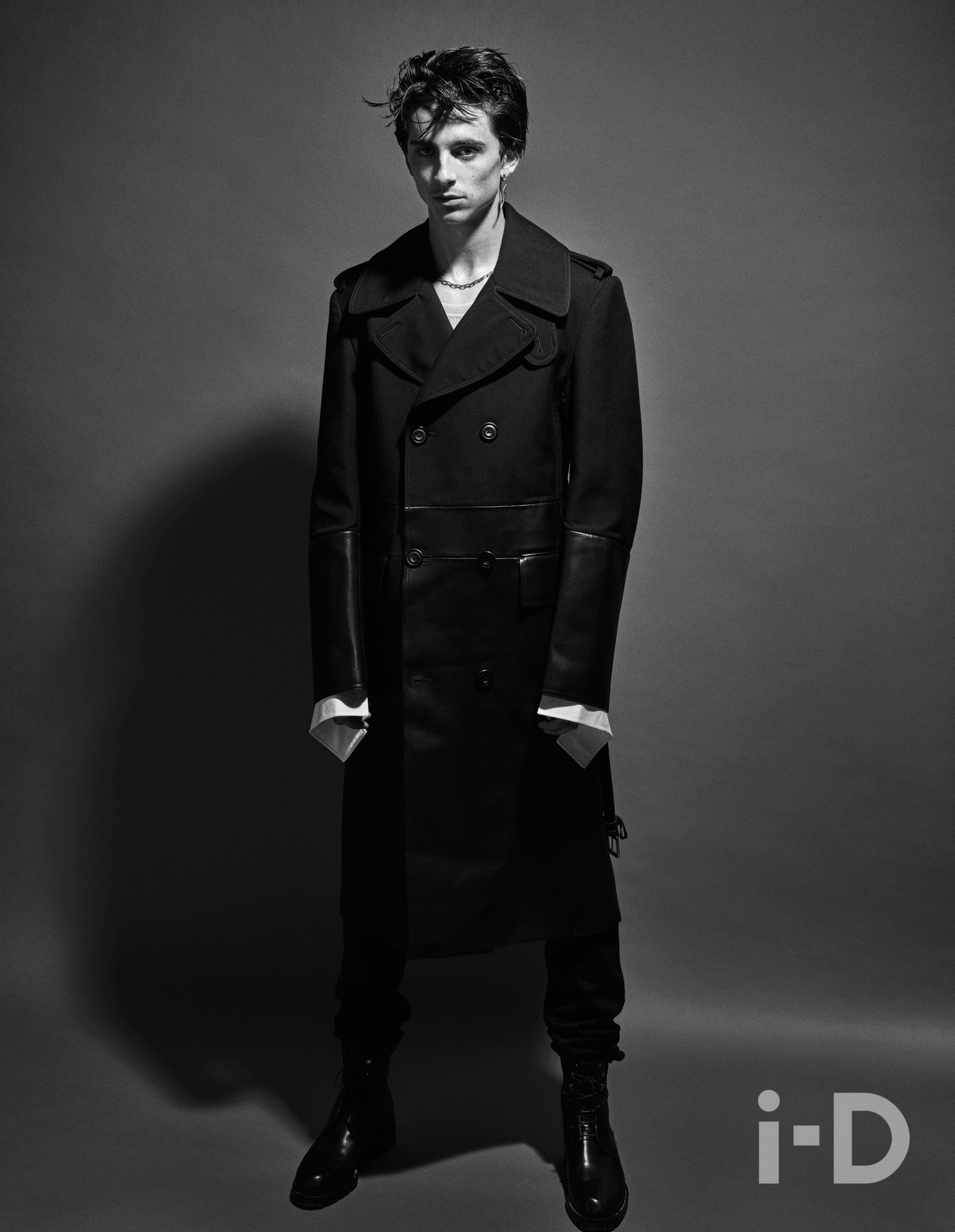
H: A lot of the time, when you do something that goes well, your thoughts immediately turn to ‘what’s next?’ Everything moves so fast that you often don’t get a chance to stop and think ‘holy shit, that was really amazing’. I just finished my tour and it’s great to step back and think this isn’t real life, this is just a really incredible job that I do.
T: Are those moments of objectivity incremental? Or do you try to set aside a chunk of time to do that?
H: I find they just happen when they happen. I get them a lot when I’m driving. I’ll be listening to something, and I’ll go back to when I was 12 or something and I’ll think ‘shit if my 12-year-old self could see me now’. I think it’s really important to have those moments because if you don’t then there’s an expectation that life is supposed to be this great and I think that’s super dangerous.
T: That terrifies me and I’m still not sure how best to navigate it. Which is why I’m grateful I grew up in New York. I spend as much time in New York as possible. I’m often fanning over Kid Cudi, because he’s from Cleveland, and I have ten fold respect for the idea of coming from somewhere that isn’t LA or New York, or any of these centres of industry, and launching your career, it seems like an incredible mountain to climb.
H: Sometimes on TV shows you can seem really nervous, but on screen you’re an extremely confident actor. Do you find it easier to play someone else rather than being yourself?
T: Oh that’s a great question. I think poison for young people publicly, in social settings or in life in general, is self-assumption, and I think that’s what makes me nervous on talk shows. I’m new to all of this, so I put myself in the audiences’ shoes and imagine them seeing this young unrecognisable guy trying to talk about movies seriously and blinking at that.
H: Do you feel pressure to be political in this day and age?
T: I don’t know if it’s a pressure, I do feel it’s a responsibility though. I was talking about this with Steve Carell, about how there was a general complacency in previous generations that everything was going along nicely and that ratcheted the stakes up really high. People our age are so much more engaged, and I think that’s a good thing.
H: We’re living in a time where it’s impossible not to be aware of what’s going on in the world. Society has never been so divisive. It’s important to stand up for what we think is right. I would love for my views to come through in the music I make and the things I do. That’s a very powerful way that we can use our voices. I think for a long time people thought ‘what I do doesn’t matter’ but revolution comes from small acts, and now people are realising that’s what sparks real change.
T: We are living in really inspiring times, because so many of these voices – people like Emma Gonzalez for example – are really young. It’s people our age who are going to have to deal with all of this, and who are dealing with it now. It was interesting being at the Golden Globes and the Oscars last year – because there was this huge tension in self-celebration, which is what award ceremonies are about – when so many people are suffering, and so many people have grievances. Not just petty grievances, but rightful grievances.
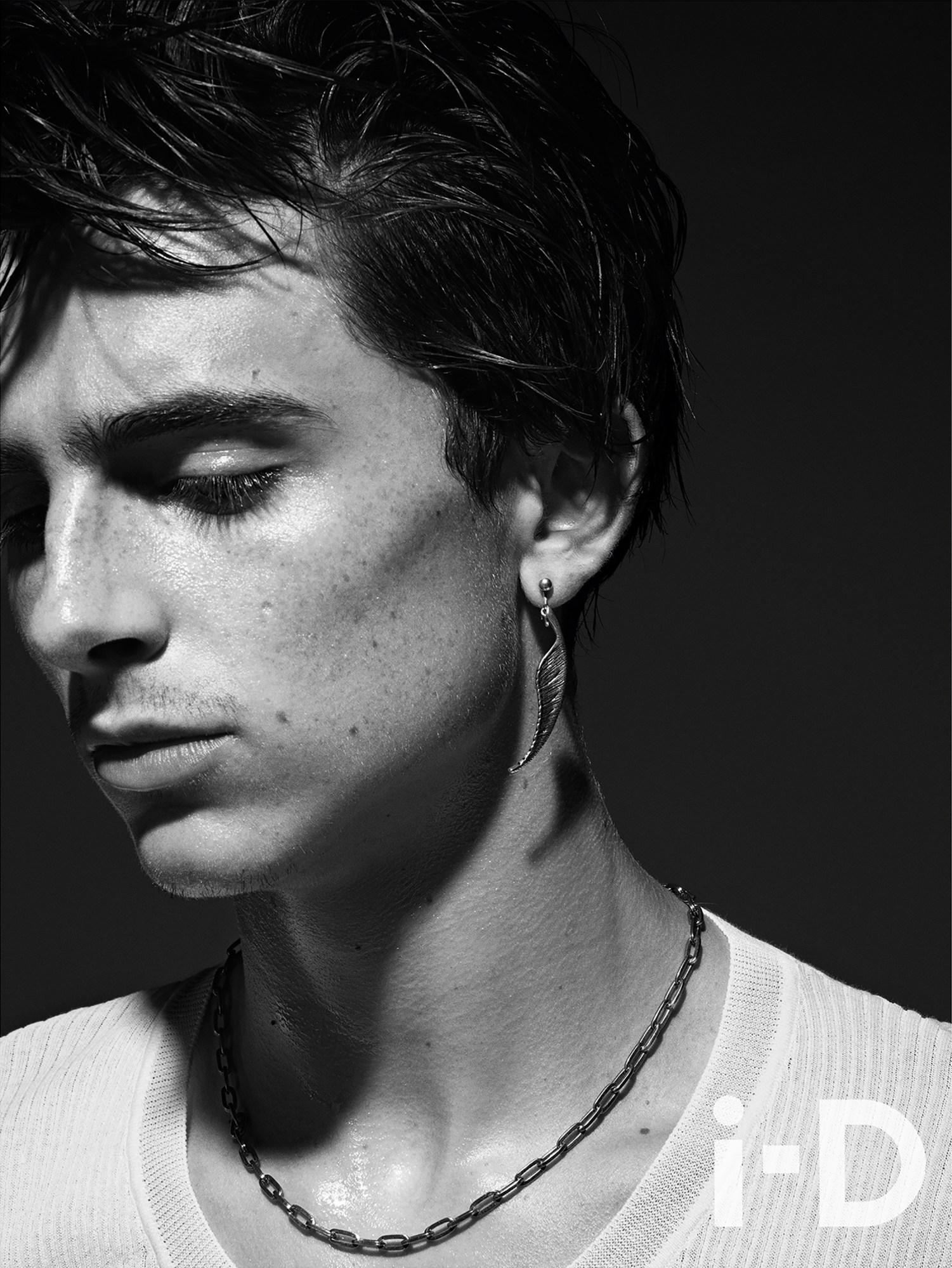
H: Today there are so many more ways for us to be engaged. I think that’s the main positive of social media, but there’s also a lot that I find super dangerous about social media. I’m interested to hear what you think? The good and the bad…
T: In the late 00s, when the Arab Spring happened in Egypt, there was a real optimism around the internet and the possibilities of social media. But in the last three or four years, there’s almost been a second wave of social media where people only hear what they want to hear and they only yell into their echo chamber. My old roommate told me he’d read interviews with the creators of the internet, where they say they’re haunted by what it has become and they despise the negativity and disinformation it can imbue. On a more micro level and in my experience, social media is really tricky to navigate because the last thing I want to do as an artist is create in a vacuum. But if you read the comments, then you’re opening yourself up to real self-damage. I am envious of a time when people really locked eyes and there wasn’t the escape of a screen. It’s the caricature of someone at a party scrolling through Tetris.
H: On a personal level, I feel a noticeable change in how happy I am when I’m not on social media. Someone once described it to me like a house party, where there are three people who are great and 23 people who aren’t that nice. You just wouldn’t go to that party would you? That kind of summarises my feelings about social media. I dip in. I see the friends I want to see and I dip out.
T: Was that intuitive for you?
H: It’s something I learnt over time. Especially starting out, because when you first start, you’re encouraged to give as much as you can. But it goes back to separating work from the rest of your life. Realising that there are things that you need to keep to yourself and things that you don’t have to share with anyone. It keeps everything a little nicer.
T: It’s about having self-awareness about your digital input, as well as output.
H: Exactly. I’m very aware that if you go on social media, and look, you can find whatever you’re looking for. If you’re looking for bad comments, you’re going to find bad comments. But people still do it. It’s like this weird self-torture.
T: It’s masochistic.
H: I used to do it when I started. Now I don’t anymore, and I feel this noticeable change in how happy I am, which is nice. But I’m not bashing social media. I think social media also does a lot of good and it’s important to notice that and grow with it.
T: Ultimately there is no going back. It’s just the way it is. So what was it like to work on Dunkirk? I had a small role in Interstellar and I was so thrilled to work with Christopher Nolan. He’s my favourite filmmaker.
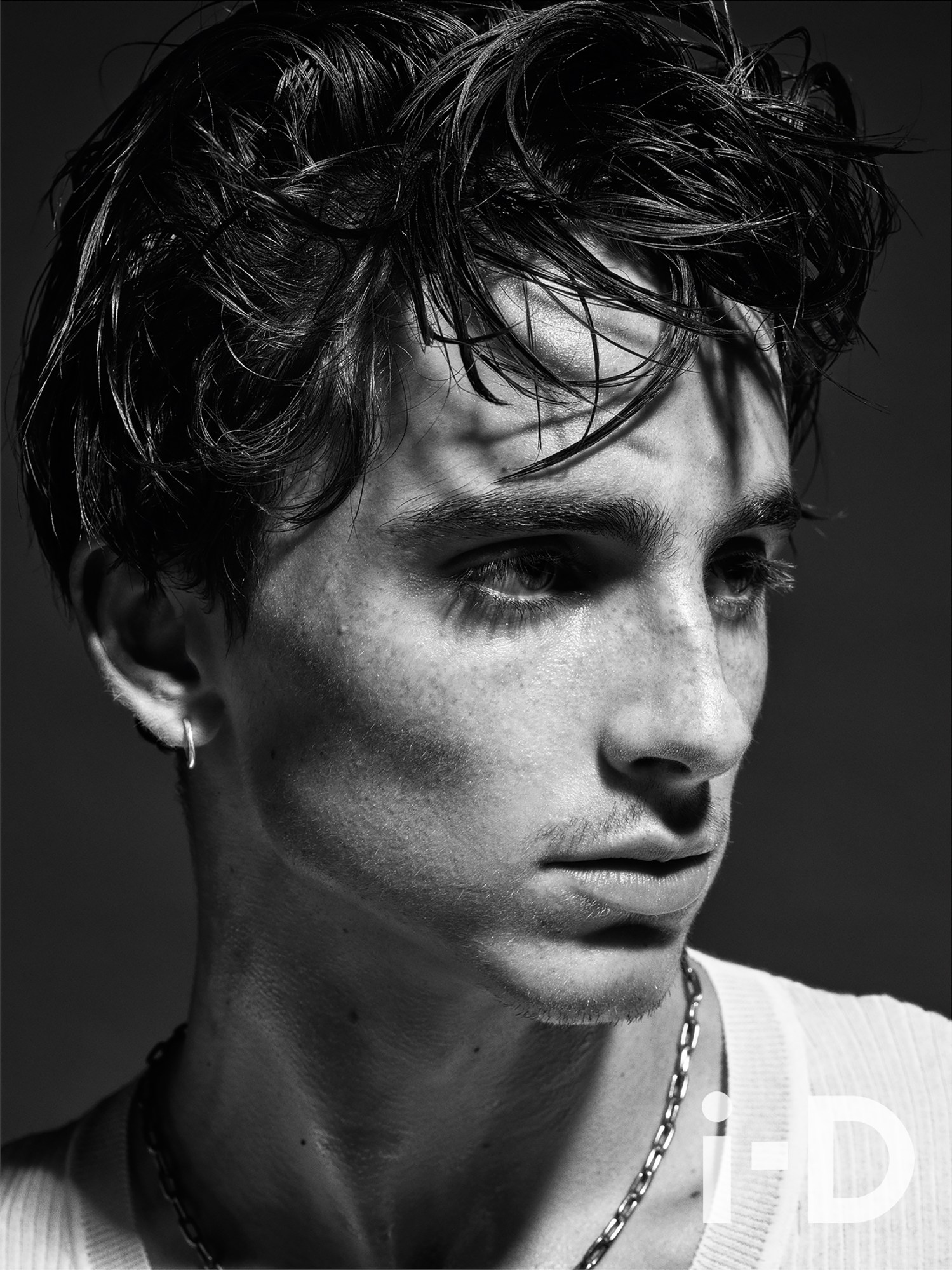
H: I’ve always been such a massive fan of Christopher Nolan too… when he was sitting at the back of the room while I was auditioning, I felt very lucky to even be in that room. Dunkirk was strange because it was my first film, so I didn’t have anything to compare it to.
T: It looked like such a barren landscape. It didn’t look like a vacation at all.
H: No, it wasn’t. When they told me we were doing a movie on a beach, I had very different ideas! I definitely enjoyed playing someone else. I loved being so far out of my comfort zone. I loved being on set and being the guy who had no idea what he was doing. I really enjoyed that.
T: Oh man, I really hope you act in something else. Because, I don’t know if it means anything from me, but I thought you were really fucking excellent in that movie.
H: Thank you very much.
T: That movie’s really amazing. Watching it, I kept thinking, ‘Oh, man, I hope Harry doesn’t think every movie set is World War II ships!’
H: Everyone’s told me that whatever I work on next will be a walk in the park compared to Dunkirk, but I enjoyed it. Thinking about where the world’s at today, do you feel a responsibility as an actor to represent a new form of masculinity on screen? The concept of masculinity has changed so much since we were growing up…
T: You know what’s really funny, I was going to ask you a version of that question but I worried it would be giving myself too much credit to think I could make a change like that. But, if you are giving me that license then I would say absolutely. It’s one of the reasons I’m so happy to get on the phone with you because growing up we did have some people to look up to, but it wasn’t as obvious. People like Lil B – I hope people won’t roll their eyes reading this – was really impactful for me because he really blurred those lines as a musician. I would be so thrilled to know that the roles I’m playing are instigating change in some way. How do I phrase this? I think there’s something to be written about this by someone way smarter than I am… I want to say you can be whatever you want to be. There isn’t a specific notion, or jean size, or muscle shirt, or affectation, or eyebrow raise, or dissolution, or drug use that you have to take part in to be masculine. It’s exciting. It’s a brave new world. Maybe it’s because of social media, maybe it’s because of who the fuck knows what, but there’s a real excitement from our generation about doing things in a new way… I would be really curious to see what you have to say about it?
H: I didn’t grow up in a man’s man world. I grew up with my mum and my sister. But I definitely think in the last two years, I’ve become a lot more content with who I am. I think there’s so much masculinity in being vulnerable and allowing yourself to be feminine, and I’m very comfortable with that. Growing up you don’t even know what those things mean. You have this idea of what being masculine is and as you grow up and experience more of the world, you become more comfortable with who you are. Today it’s easier to embrace masculinity in so many different things. I definitely find – through music, writing, talking with friends and being open – that some of the times when I feel most confident is when I’m allowing myself to be vulnerable. It’s something that I definitely try and do.
T: That’s really beautiful and inspiring, and certainly it goes back to feeling comfortable in chaos and creating in madness. It’s almost a high to be vulnerable. I really get that. I think it can be achieved in art, but also in intimacy. It’s the craziest feeling to achieve that vulnerability. If us having this conversation, in any infinitesimal way, can help anyone, a guy, a girl, realise that being vulnerable is not a weakness, not a social barrier. It doesn’t mean you’re crazy or hyper emotional, you’re just human, which I think is something your music gets at and hopefully my movies do too. Humans are complex; we need to feel a lot of things. We are not homogeneous.
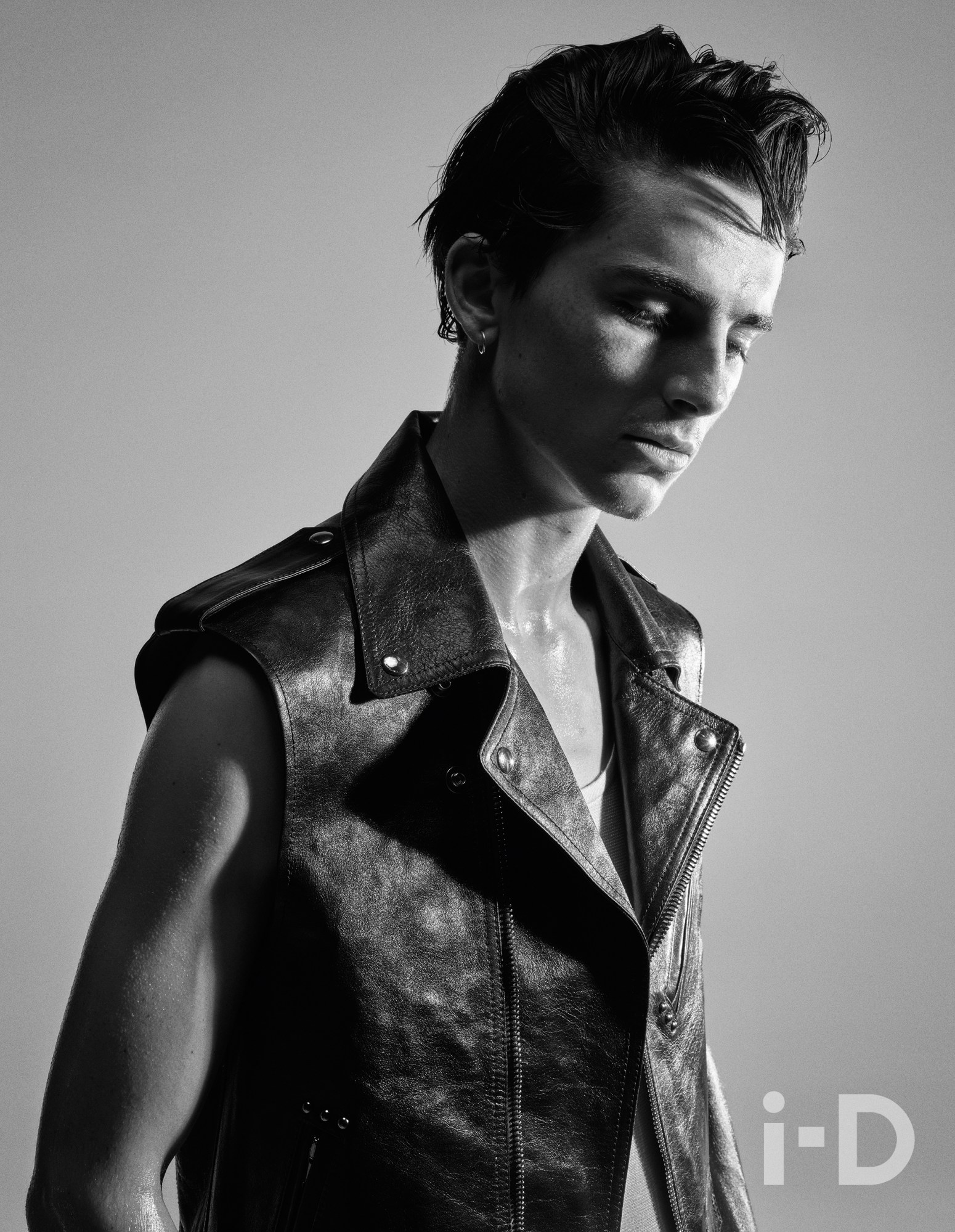
H: It’s not a straight line for sure… Couple of things for you… The last couple of years have been nuts. How are you finding it? Are you having fun?
T: Dude, I feel so much gratitude. I say it to my dad a lot and he makes fun of me because I never used to talk like this but I see people our age and how invigorated they are for the world and it inspires me. Three years ago, I was nervous because people talked about social media affecting attention spans and how nobody could sit down anymore, and art and film were relics. But I actually feel like this stuff is urgent. And for whatever fucking reason I have an ability now to choose what to bring life to. Right now, I’m working on Little Women in Boston with Greta Gerwig, Saoirse Ronan and Emma Watson and I just pinch myself that I get to be this fly on the wall for this legendary narrative. Did you get a break in the first few years? Or was it pretty intense?
H: They were pretty intense. It’s only in the last two years that I’ve really had the chance to stop and reflect. I’m definitely thankful that I had a moment to process everything. Now I’m excited about whatever’s next. Are you excited about the future? And I mean your future, not the future of humanity or anything like that.
T: Yeah, sorry man, I’m just going macro!
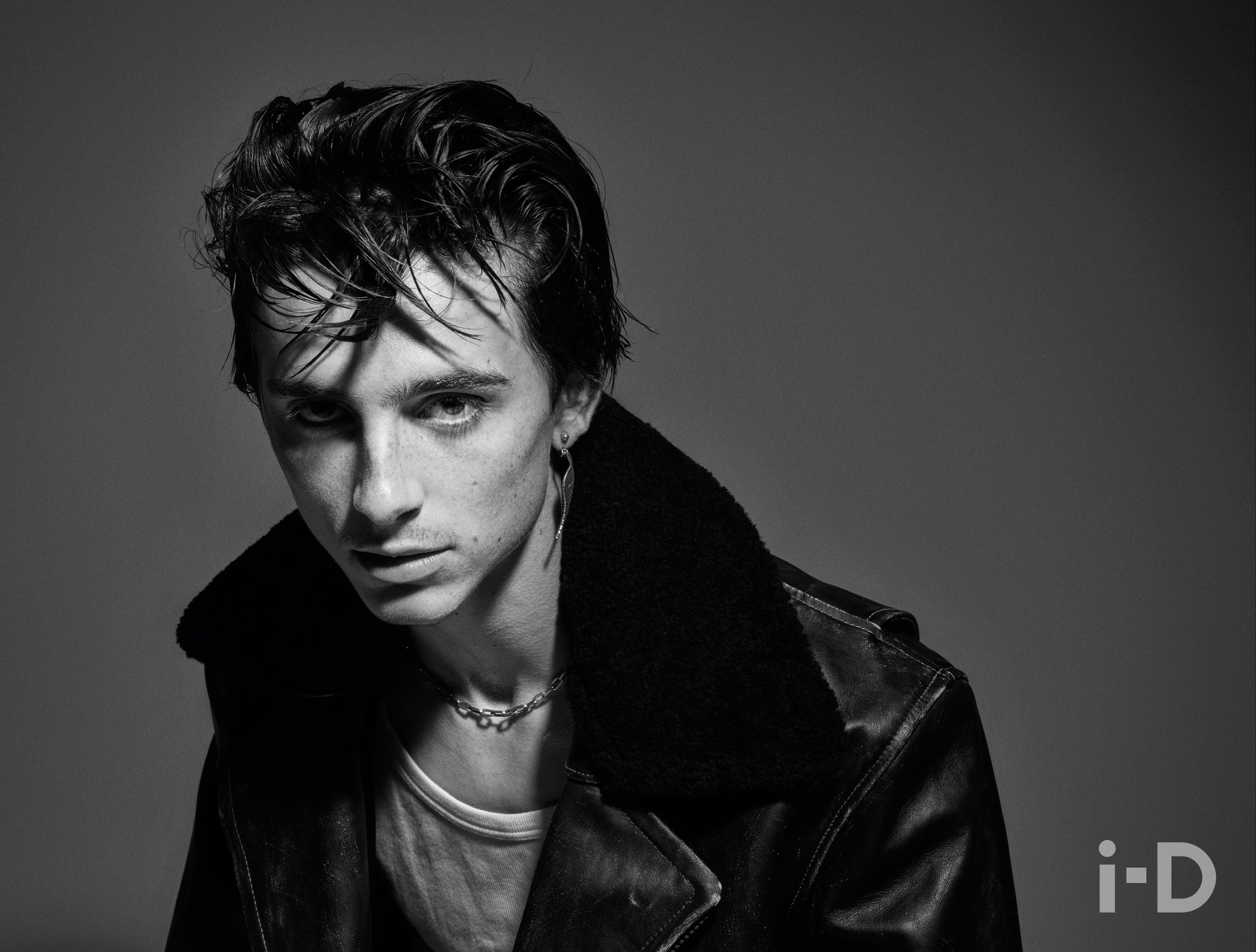
H: You can choose your films now, which is amazing. When you’re starting out, you spend so long wanting people to watch your films or listen to your music and then when they finally do you always think ‘what’s next?’ What do you worry about now?
T: Making the right choices. I think there’s an anxiety in us that correlates with our age. I want to be able to have a conversation with you in 15 years time. It’s always been about trying to work with great directors for me. I’m working with Greta Gerwig now. Then I’m doing something with one of my favourite directors ever; a really beloved American art house director. Then I’m going to do Dune, directed by Denis Villeneuve. I’ve always dreamed of being in a big movie like Dunkirk or Dark Knight or Inception. So that’s the truth, Harry. There’s fear too, like there always was, but I’m glad that fear revolves around movies and choices and not whether or not I can pay my rent. I’ve a lot of gratitude for that. I hope we get a chance to be on a film set together. Do you know what you’re working on next?
H: I’m making my second album right now, so I’m going to do that, read a lot and see what happens. When I got the role in Dunkirk, it happened right at the start of my first album, so I had to stop everything for five months. But stuff like that always happens when it happens, so I dunno, man. I’m enjoying not knowing to be honest.
T: I’m finding that to be true with a lot of the musicians I’ve met. They’re on way less of a schedule then actors, who literally have to show up at a certain time. I dunno man; it must be like 3am wherever you are right now. Musicians operate at their discretion.

H: When I was in the band, I always knew what I was doing two years in advance. Now, I’m making records on my own it’s pretty exciting because I know this is all I’m going to be doing until I finish the record. It’s a new way of working.
T: I imagine the creative process working on an individual album must be way different to when you were younger making music in tandem with others.
H: Yeah, when I started I really didn’t know what I was doing. So I tried to write as much as possible, with as many different people as possible and try and learn as much as I could. I guarantee I wrote a lot of really, really bad shit before I wrote anything good… Just a couple of things left for you… If you were told you were only allowed to listen to one song, watch one movie, read one book and talk to one person for the rest of your life, what would you choose?
T: Okay, one song, one movie, one book, one person… I just wrote that down. I put it in my notes. That’s a great question. One song would be Rain by Kid Cudi. One movie would be Punch Drunk Love. One book… The Book of Disquiet. That’s just what I’m reading now. And one person… I’ll keep that mysterious. I’ll keep that to myself, but I have a clear answer in my head. What about you? Can I flip that on you? Is that fair?
H: Of course. Feel free. My song would be Madame George by Van Morrison. My movie would be Goodfellas . My book would be… I have two. It would either be Haruki Murakami Norwegian Wood or Rob Sheffield’s Love Is A Mixtape . Which I would suggest you read if you haven’t read it already. It’s really beautiful.
T: And who’s your person? H: My person… I’m going to do the same as you, I’m going to withhold.
T: Alright, fair, fair!
H: I think it’s a fair exchange.
T: Yes, yes. Oh, man.
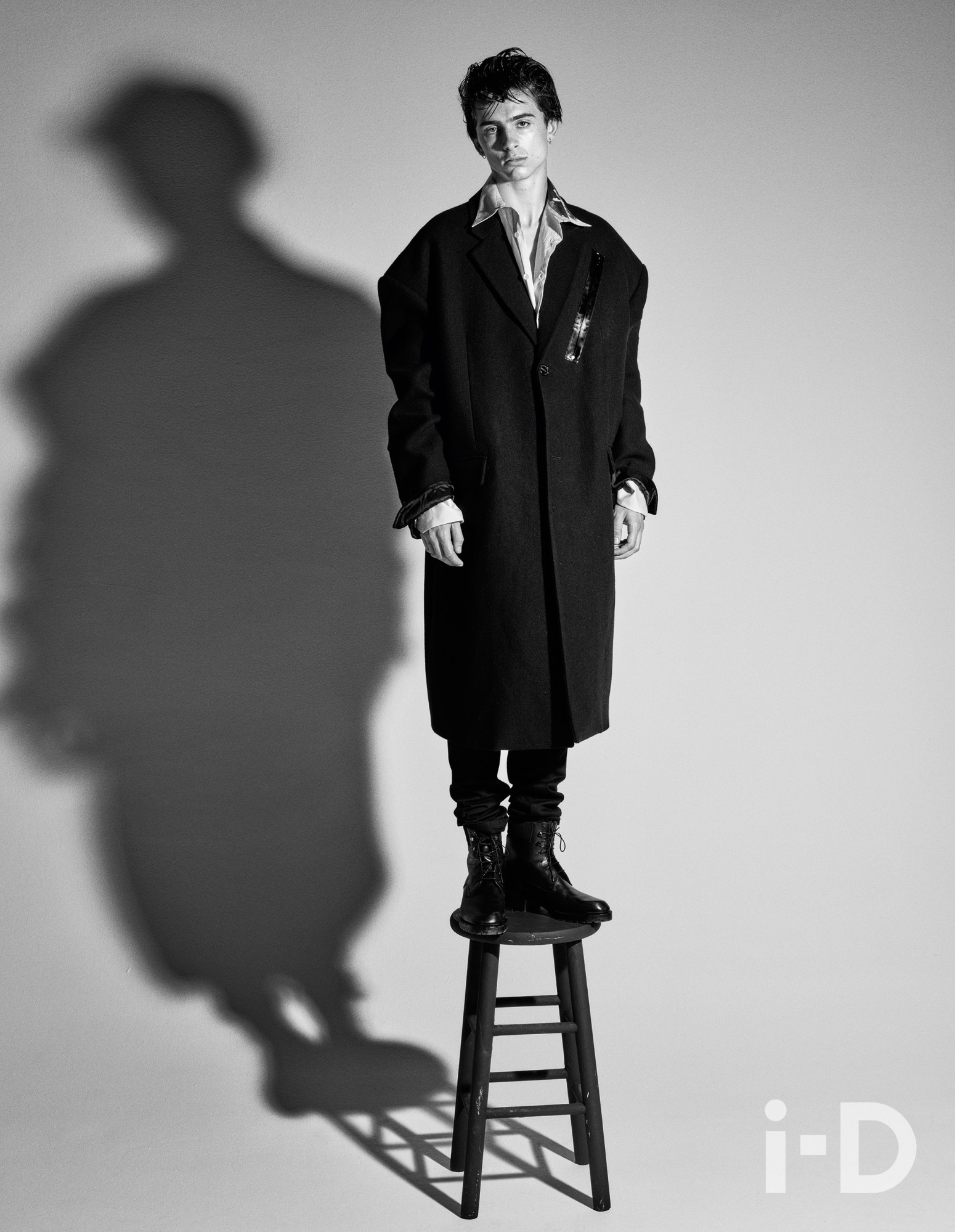
H: Alright, a couple of quick fire questions, then I have one final question for you.
T: Okay…
H: Alright. What’s your go to karaoke song?
T: Heart Shaped Box but I’m too wary of doing it in front of people I don’t know. H: Alright. New York or LA?
T: New York. New York. Hands down. When I land I kiss the tarmac, baby. H: Football or basketball?
T: Oh, man… I declare a tie. H: Favourite TV show?
T: The Office.
H: Kobe or LeBron? Now we get to the hard stuff…
T: Erm, erm… Look, LeBron is the athlete of my generation. Kobe wins on the talent. I loved LeBron when he went to Miami. I loved him again when he went to Cleveland. Now I’m like a fanboy that’s trying to buy a Lakers jersey. H: Uh huh. Alright. What do you wear in bed?
T: Nothing. H: Jay-Z or Beyonce?
T: Oh, man, that’s a no win because they’re both so awesome. JayBay. H: Last text you sent?
T: I’ll tell you right now… [looks at phone] I gotta text some people back! The last text I received was from my Dad about Beautiful Boy, he says that it had a good opening, then he links to a box office report about Venom. He would never see Venom, so I don’t know why he sent me that. H: Guilty pleasure?
T: Rick and Morty, maybe? That’s not guilty though. A lot of people love that. H: Have you seen Big Mouth?
T: No, I haven’t. Do I have to get into that? H: Yeah, it’s on Netflix. Go watch Big Mouth.
T: Alright. H: Cardi B or Nicki Minaj?
T: Oh my god… Look, Nicki went to my high school but… Cardi’s a legend so why can’t we all just love each other. I wish they’d never got into that fight. That was so surreal. Look, Nicki’s a legend, Cardi’s bringing that heat. What about you? H: I’m asking the questions.
T: Fair, fair. H: Where’s your happy place?
T: It’s a mental happy place, it’s a summer’s day in New York. H: Nice. I have one final question for you before we finish. What is the meaning of life?
T: Um… Ah… That we’re all only here for so long. Live and let live. Love deeply. Love openly. And know that the wise man knows he’s ignorant but cultivates more understanding. H: Very nice, very nice. It’s been a pleasure. Thanks, man.
T: Man, what a pleasure, thank you so much for doing this!
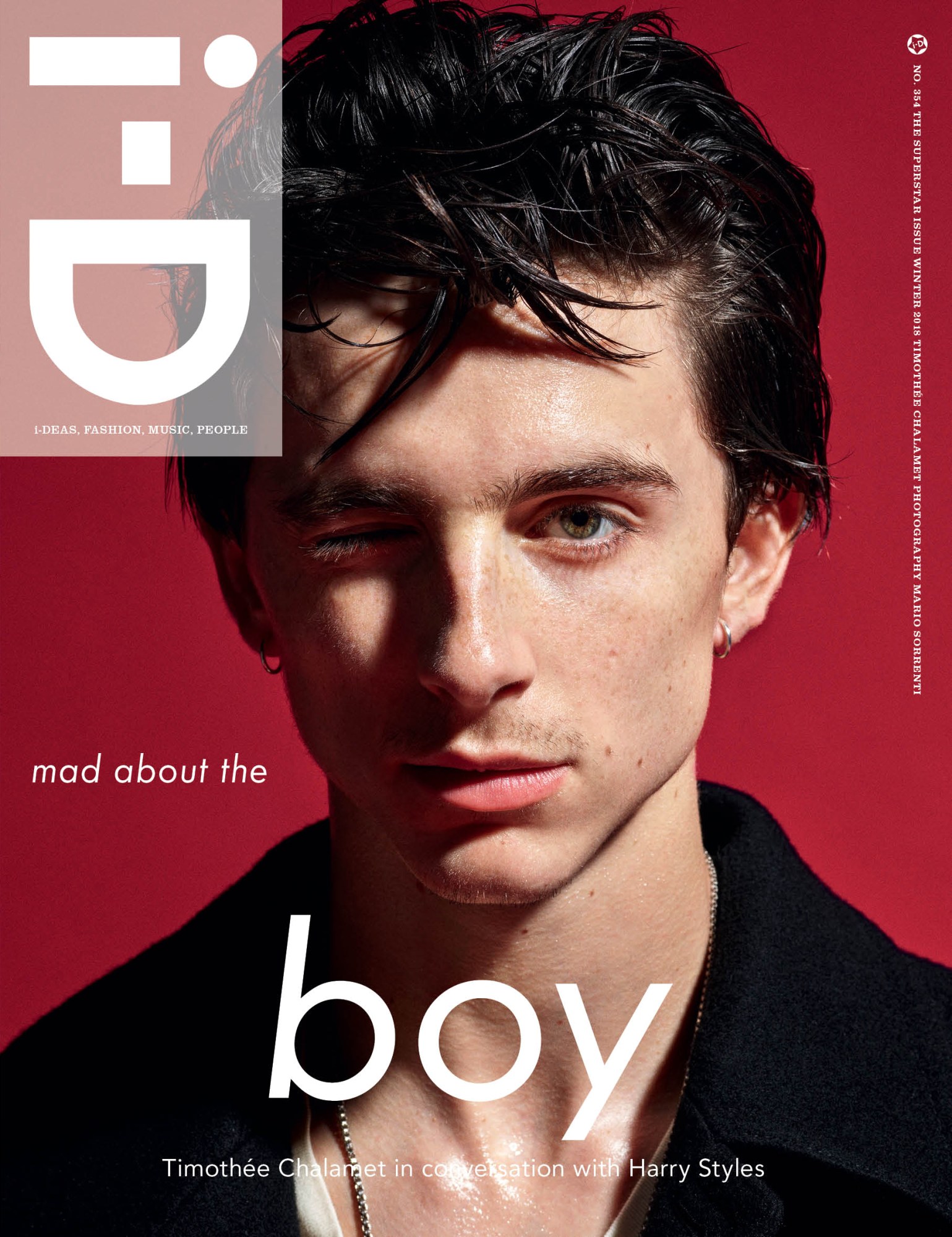
If you want stuff like this straight into your inbox, click here to subscribe to the i-D newsletter.
Credits
Interview Harry Styles
Photography Mario Sorrenti
Fashion director Alastair McKimm
Hair Duffy at Streeters
Grooming Caoilfhionn Gifford using Tata Harper Skincare
Lighting technician Lars Beaulieu
Photography assistance Kotaro Kawashima
Digital technician Chad Meyer
Styling assistance Maggie Foster, Madison Matusicha and Abby Adler
Hair assistance Lukas Tralmer
Production Katie Fash and Steve Sutton
Casting director Samuel Ellis Scheinman for DMCASTING
